Complete Dentures & Partials
There are different types of dentures depending on the needs and variations of an individual’s oral anatomy. Paramount Family Dentistry is here to find the best type of denture for you, and we can advise on every aspect of your dental treatment.
Patients who have lost some or all their natural teeth generally suffer from a decreased ability to chew food properly which often leads to diet limitations, and weight loss. Also, progressive bone loss occurs in the areas where the teeth are missing resulting in sagging, or sunken in facial features.
Dentures not only serve to replace a person’s missing teeth, but also improve their quality of life by enabling them to enjoy eating again, and smile freely without feeling embarrassed.
Dentures also help to support the cheeks and lips, which often results in a more natural, youthful appearance by reducing the wrinkles in those areas.
Types of Dentures We Offer
Complete dentures are indicated for patients who are missing all of their upper and/or lower teeth, or plan to have all of their teeth extracted. We offer several different types of dentures in order to best suit the needs of our patients.
Conventional Complete Dentures
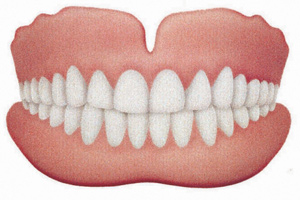 One of the most common dentures we make are conventional complete dentures. A conventional complete denture is made and delivered to the patient after the teeth have been extracted the bone tissues have healed. Healing may take several months depending on many factors. The base of the upper denture covers the entire palate (the roof of the mouth). When the base of the upper denture rests against the gums and palate, it makes a seal to hold the denture in place.
One of the most common dentures we make are conventional complete dentures. A conventional complete denture is made and delivered to the patient after the teeth have been extracted the bone tissues have healed. Healing may take several months depending on many factors. The base of the upper denture covers the entire palate (the roof of the mouth). When the base of the upper denture rests against the gums and palate, it makes a seal to hold the denture in place.
The lower denture has a horseshoe shape so there is room for the tongue and muscle attachments. It rests on the gum and bone tissues of the dental ridge. A thin film of saliva holds it in place. The cheek muscles and tongue also help hold the lower denture in place.
Implant-Supported Complete Dentures
A complete denture may also be attached to dental implants, which provide a more secure fit. Implants are posts that are surgically placed in the upper or lower jaw. Properly placed implants make the denture stable and can help reduce bone loss.
Many patients find that implant-supported dentures are more comfortable and secure than conventional dentures. However, not everyone is a good candidate for implants. Patients must be in good health and have enough bone to support the implants.
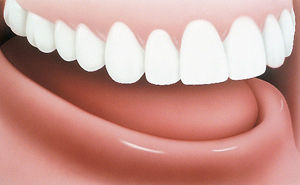 |
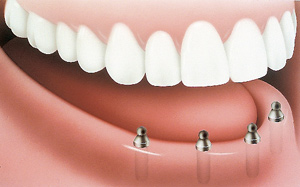 |
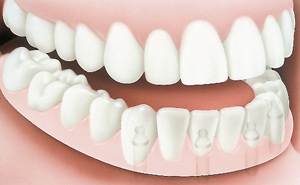 |
| Before | With implants and posts (abutments) | After |
Immediate Dentures
Some patients may have the option to get immediate dentures. These dentures are made before the remaining teeth are removed. Once the denture has been made at the lab and is ready for you at your dentist’s office, the dentist removes your teeth and the denture is placed right away. The main advantage of immediate dentures is the denture wearer does not have to go without teeth during the healing time. The main disadvantage of immediate dentures is once healing is complete, the dentures often need to be relined, and in some cases the denture needs to be completely re-made.
Partial Dentures
As its name describes, partial dentures are indicated for patients missing a few teeth and have some healthy teeth remaining. Partial dentures usually have replacement teeth fixed to an acrylic, or nylon base that matches the color of your gums. The base may cover a metal framework. Partial dentures often have some form of clasp that attaches to your natural teeth.
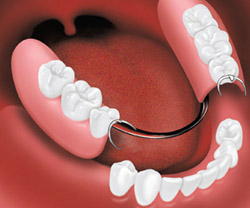 |
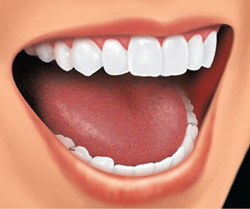 |
| Partial denture being placed | Partial denture in the mouth (showing clasps) |
Advantages of removable partial dentures:
- usually less expensive than fixed bridges or implants
- usually easier to repair than fixed bridges
Disadvantages:
- can be less stable than other choices
- they can break or be lost
- can be uncomfortable
- some people are embarrassed to take out their teeth at night and for cleaning
- may need more frequent replacement than other options








